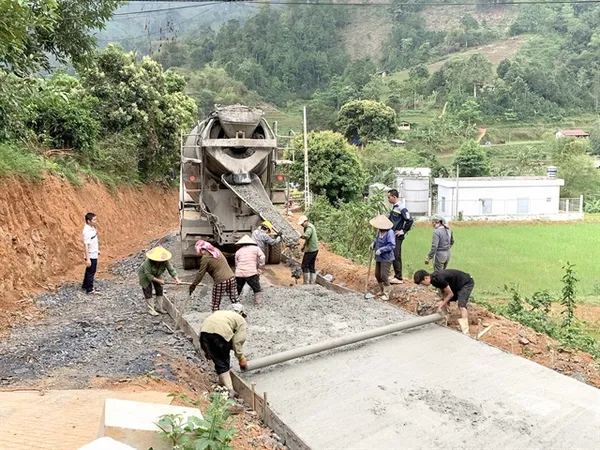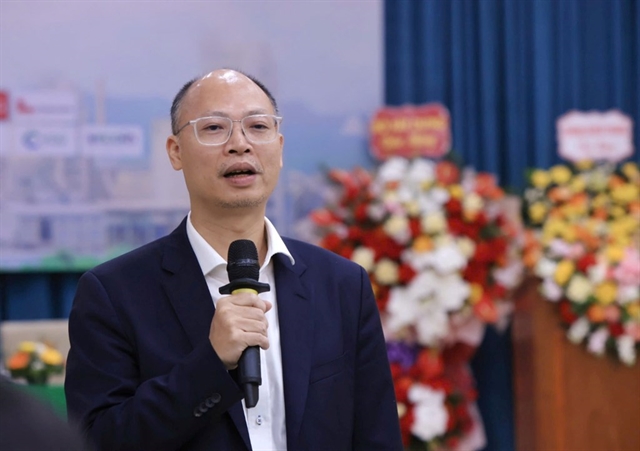 Economy
Economy

 |
| Lê Trung Thành, Director of the Department of Building Materials under the Ministry of Construction. VNA/VNS Photo |
On December 16, Circular No 10/2024/TT-BXD on managing the quality of building materials, issued by the Ministry of Construction, will officially take effect. This legal framework aims to eliminate unfair competition in the building materials market, boosting confidence for domestic businesses to invest in and produce high-quality products which meet consumer demands. Lê Trung Thành, Director of the Department of Building Materials under the Ministry of Construction, discussed this issue with Vietnam News Agency.
What challenges is the building materials industry currently facing? How does unfair competition caused by substandard goods affect businesses in this sector?
Việt Nam's building materials industry has a robust production capacity, successfully exporting key products like cement, ceramic tiles, sanitary wares and construction glass to international markets. From 2014 to 2021, these products performed well and achieved significant breakthroughs.
However, since 2022, key products such as these have faced difficulties in both production and consumption. The Ministry of Construction has reviewed these challenges and reported them to the Prime Minister, who subsequently chaired a national conference to resolve obstacles and promote sustainable production and consumption of building materials.
Currently, the industry is grappling with unfair competition from low-quality, counterfeit and imitation products infiltrating the market. These substandard goods compete unfairly with Việt Nam's certified, internationally recognised building materials that meet quality standards and are exported worldwide.
To address this, the Ministry of Construction has implemented the Prime Minister's directive to strengthen quality control of building materials, ensuring construction quality and protecting consumer rights. Citizens will benefit from access to high-quality products that comply with regulations.
How will the Circular address these challenges?
Issued on November 1, 2024, and effective from December 16, 2024, Circular No10/2024/TT-BXD aims to tackle key issues by clearly categorising 26 groups of building material products. Products in Group 2 must undergo conformity assessments, while those in Group 1 will be subject to stricter quality control measures.
The Circular strengthens quality management of building materials at both central and local levels, ensuring that high-quality products are sold in compliance with legal regulations. Substandard, counterfeit and imitation goods will be identified and penalised.
The goal is to enhance production capacity and elevate the national brand of Việt Nam’s building materials domestically and globally.
What warnings has the Ministry of Construction issued regarding low-quality building materials?
Over the past two years, the Ministry of Construction has received numerous complaints from industry associations, such as the Việt Nam Association of Construction Ceramics, the Việt Nam Glass and Glassware Association, the Việt Nam Cement Association and the Việt Nam Concrete Association, about unfair competition, especially the prevalence of substandard products.
For instance, in the cement industry, some manufacturers lacking adequate equipment and skilled personnel have introduced products with names and labels resembling high-quality brands. This confuses consumers, contractors and investors when selecting materials for construction projects.
Additionally, some construction projects use imported materials with poorly controlled quality, posing risks to the long-term durability of buildings.
To address these issues, Circular No 10 introduces measures to classify and group building materials by quality, ensuring the safety and reliability of both construction projects and the materials used. Key materials such as cement, ceramic tiles, sanitary wares and construction glass, if not strictly quality-controlled, can result in significant losses for the construction sector.
For example, using substandard materials may require repairs and maintenance over time, increasing costs by 10–15 per cent of the project value. Building materials account for 60–70 per cent of construction costs, so if materials fail to meet quality standards, repair and replacement costs could reach 50 per cent of the original material cost.
For projects valued at VNĐ100 billion, repair costs could escalate to VNĐ40 billion when substandard materials are used.
What benefits will consumers enjoy once the Circular comes into effect?
Circular No 10 ensures significant advantages for consumers in selecting quality products. Under the regulation, all building materials on the market must clearly declare their quality. Products in Group 2 must carry conformity certificates verifying adherence to quality standards.
Consumers can request conformity certificates and product origin information to ensure safe usage. Products lacking these certifications or quality declarations will be removed from the market, helping consumers avoid substandard materials.
When purchasing building materials, consumers should focus on three key factors, including product origin, conformity certificates and declared quality standards.
Retailers must provide complete information on these aspects. For example, products made in Japan must include certification from a Vietnamese conformity assessment body. Similarly, for Chinese imports, consumers should check for conformity certificates to confirm quality compliance.
Once Circular No 10 is enforced, businesses will be required to strictly adhere to these standards and provide detailed product quality information. Non-compliance will result in penalties.
Furthermore, the Ministry of Science and Technology has established regulations on product traceability. Consumers can ask sellers for product origin, conformity certificates and quality declarations. Tools like QR codes can also be used to verify product information before purchase, ensuring informed decision-making.
What penalties will violators face?
Penalties for violators will depend on the severity of the violations. The Ministry of Construction, along with relevant authorities, will enforce administrative penalties under decrees applied to the construction sector.
Violations related to the quality of building materials, such as failure to declare product quality, lack of conformity certificates or non-compliance with standards, will be handled in accordance with legal regulations.
The primary goal of Circular No 10 is to establish comprehensive management of building material quality across five key stages: production, export, import, market circulation and use.
By doing so, it aims to filter out high-quality materials while identifying and addressing substandard products, strengthen oversight and enforcement to ensure compliance and rectify manufacturing and trading practices involving counterfeit, imitated, or low-quality goods, which can compromise construction quality and adversely affect daily life.
Violators who fail to comply with these regulations may face fines, restrictions on operations, or other legal consequences, depending on the nature of the infractions. These measures are designed to protect consumers, enhance the quality of construction projects, and promote fair competition in the building materials market. – VNS




